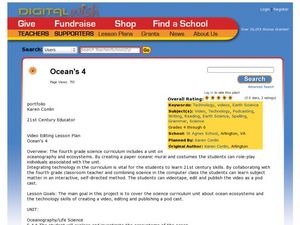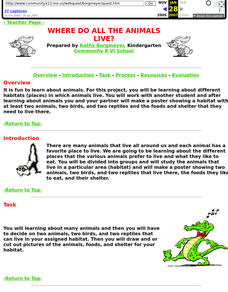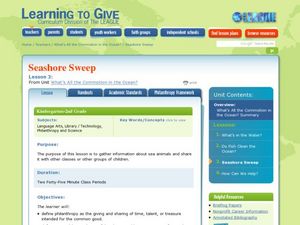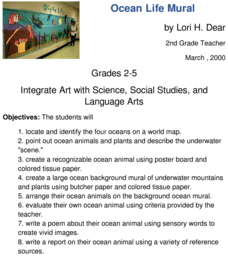Curated OER
Under the Sea
Students identify and interpret that non-fiction books have features like a table of contents, a glossary, and an index, which can efficiently help them find information. They also identify how to narrow the search for information by...
Curated OER
Animal English Exercise
In this interactive animal science worksheet, students answer seven true or false questions and six word scrambles based on their knowledge of animals.
Curated OER
Blue Planet: Seas of Life - Tidal Seas
After viewing the video Blue Planet: Seas of Life, students review oceanic concepts. In this earth science lesson plan, students reflect on the effect tides have on living things and conduct research to create a "tidal trivia" game....
Curated OER
Coral Reef Community
Students explore the coral reef. In this food chain lesson, students study the plants and animals of the coral reef and how they each play a role in that ecosystem. They participate in a class play to demonstrate the types of animals in...
Curated OER
Ocean's 4
Young scholars create a video about their oceanography unit where they role-play various animals from the ocean. In this oceanography lesson, students create a paper mural and then costumes for the animals. Young scholars role-play the...
Curated OER
Creating a Pond Habitat
Students create a pond habitat inside and outside their classroom. In this pond lesson plan, students create a habitat with animals, water, and plants in order to create a proper pond habitat.
Curated OER
Where Do All the Animals Live?
Students study animal habitats and make a poster showing two animals, two birds, and two reptiles in their habitats.
Curated OER
Under the Sea
Students imagine and describe fictitious sea animals that might live in the ocean. After reading an article, they reflect on new discoveries found in the ocean recently. Using the internet, they research the interdependence of animals...
NOAA
Lost City Chemistry Detectives
In 1977, scientists discovered hot springs in the middle of deep, cold ocean waters near the Galapagos Islands. Scholars research the chemical reactions that explain what scientists found at the Lost City. A discussion connects many...
MDE k-12
Lesson 5: The Journey Becomes Larger Than Life!
Many muralists throughout history have focused on using their art to represent aspects of their culture or community. After thoroughly researching several muralists, budding artists will create a larger than life mural that contains...
Curated OER
Hawaii's Sandy Shores
Investigate Hawaii's sandy shore ecosystem! Start by creating a vocabulary list and having your class complete a KWL chart. Next, pass out the "I think of" sheet. Each learner will then choose a word from a beach bucket and add it to...
American Museum of Natural History
What's This? Feeding
Some species have pretty creative methods for catching food. Young scientists learn about some interesting ways organisms get the nutrients they need by navigating an online interactive lesson that would be suitable for a remote learning...
Curated OER
Seashore Sweep
Young scholars gather information about sea animals. For this ocean lesson, students read a story about the ocean and seashore. They discuss the needs of seashore animals and create a Mystery Ocean Animal riddle book. Young scholars...
NOAA
Deep-Sea Ecosystems – Life is Weird!
A pool of brine in the deep sea can be up to four times as salty as the surrounding sea water. The deep sea ecosystem relies on chemosynthesis and the organisms that live there are often strange to us. The lesson focuses on researching...
Curated OER
Oceans and Coasts
Learners explore the topic of marine pollution. They define key vocabulary words, list examples of marine pollution, complete a true/false handout, read an article, and participate in a class discussion.
Curated OER
Build a Polyp
Young scholars research coral polyps. In this coral polyps lesson, students discover the anatomy of a coral polyp and how they feed. Young scholars create an edible coral polyp model.
Curated OER
Investigating Ocean Life
Sixth graders explore the various forms of ocean life. They research a creature that lives in the ocean. Students use their research information to create a series of HyperStudio stacks about their sea creature.
Curated OER
Specialized for the Sea
Students use pictures and make a mural to investigate how ocean animals are adapted to certain parts of their environment.
Curated OER
Who Would Win? Killer Whale vs. Great White Shark Storia Teaching Guide
Teacher guides are wonderful tools with tons of ideas that help you relate content in many different ways. Using the high-interest book, Who Would Win? Killer Whale vs. Great White Shark, learners hone their discussion and reading...
Curated OER
Colossal Squid Caught in Antarctic
Students define the word colossal, then read a news article about an enormous squid caught off Antarctica. In this animal studies and current events lesson, the teacher introduces the article with dictionary and vocabulary activities,...
Scholastic
Study Jams! Aquatic Ecosystems
Mia's friends are fish-sitting while she is away on vacation. Zoe divulges to Sam that different animals need different habitats, and that there are both freshwater and saltwater ecosystems. Examples of the kinds of organisms found in...
California Academy of Science
Coral Reef Habitat Match
Different animals live in different habitats, and each animal has specifically adaptive traits that make them tailor-made for their environments. This is true on land and in the ocean. Little ones examine how various marine animals have...
Curated OER
Sand Travels
Students examine how sand is formed by erosion and that it can be moved by streams, rivers, and ocean currents in this unit of lessons. They study waves and currents, and structures that change how sand moves by creating story charts,...
Curated OER
Ocean Life Mural
How many oceans can you name? First, have learners try to name as many oceans as they can, and then have them locate and identify the oceans on a world map. They create a recognizable ocean animal using poster board and tissue paper....
Other popular searches
- Ocean Ecosystems Animals
- Oceanic Trenches and Animals
- Grassland Animals Ocean
- Ocean Plants and Animals
- Oceans Animals
- Oceanic Animals Adaptations

























